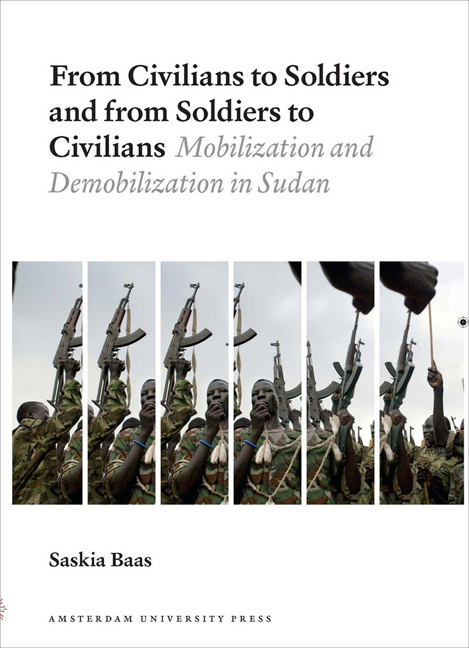Book contents
- Frontmatter
- Dedication
- Contents
- Acknowledgements
- List of Acronyms
- 1 Introduction
- 2 Recruitment
- 3 Becoming a soldier
- 4 At War's End
- 5 DDR Policies and Realities in Sudan
- Concluding Remarks
- Appendix I: Checklist Interviews Former Combatants
- Appendix II: Example of an Interview Report
- Notes
- Bibliography
- Index
5 - DDR Policies and Realities in Sudan
Published online by Cambridge University Press: 15 January 2021
- Frontmatter
- Dedication
- Contents
- Acknowledgements
- List of Acronyms
- 1 Introduction
- 2 Recruitment
- 3 Becoming a soldier
- 4 At War's End
- 5 DDR Policies and Realities in Sudan
- Concluding Remarks
- Appendix I: Checklist Interviews Former Combatants
- Appendix II: Example of an Interview Report
- Notes
- Bibliography
- Index
Summary
Introduction
In the context of a civil war that ends through a negotiated settlement, DDR processes serve as a solution to the abundance of weapons and idle combatants, which could cause insecurity in a post-conflict setting. Often, a DDR program is one of many tools in a more comprehensive Security Sector Reform (SSR) strategy, which envisions stabilization in the long term. DDR programs aim at ‘neutralizing’ former combatants in the short term, by ensuring their socioeconomic reintegration into society, diverting them away from a criminal path, or continued armed rebellion. The expected effects are considered to be twofold: first, a direct positive effect of DDR on the security situation is assumed. In addition, successful DDR is thought to help create a conducive environment during the few years immediately after the signing of the peace agreement, which are considered crucial for achieving full implementation and sustainable peace. Successful implementation of DDR programs and the overall success of the peaceful transition are therefore thought to be interlinked, although empirical evidence for this assumption is currently lacking.
In the previous chapter the coming about of the Comprehensive Peace Agreement and the Eastern Sudan Peace Agreement were discussed. Both agreements contained provisions for a DDR process, which will be the topic of this chapter. It is useful to recall that the contexts of the two DDR processes differ significantly. The CPA came about in the context of a balance of power between the two warring factions, and the agreement lays down the principles for a possible independent South Sudan. The CPA's interim period sets the stage for a process of transforming the SPLA into an official army in case of a Southern secession. During the interim period, the SPLA already functions as the official army in the semi-autonomous region of South Sudan. The Eastern Front, consisting of the Beja Congress and the Rashaida Free Lions, never built enough strength to challenge the government army, and signed the ESPA in an underdog position, after having lost the support of their main military backers. The agreement stipulates disbandment of the armed factions, by integrating them into the state security sector and DDR.
- Type
- Chapter
- Information
- From Civilians to Soldiers and from Soldiers to CiviliansMobilization and Demobilization in Sudan, pp. 177 - 202Publisher: Amsterdam University PressPrint publication year: 2012



